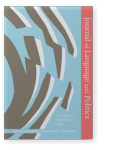Vol. 20:2 (2021) ► pp.197–225
The Twittering Presidents
An analysis of tweets from @BarackObama and @realDonaldTrump
This paper uses a Systemic Functional Multimodal Discourse Analysis (SF-MDA) approach to analyse tweets from the Twitter accounts of Presidents Barack Obama (@Barack Obama) and Donald Trump (@realDonaldTrump). The tweets were posted during the last nine months of President Obama’s effective presidency and the first nine months of President Trump’s presidency. The tweets are analysed using automated text analysis which is interpreted through an SF-MDA lens, supplemented by manual analysis. The analysis examines ideational and interpersonal emphasis in the tweets with the aim of showing how the composition and content construct a view of how each president and his presidency are presented to the public. The findings suggest marked contrasts in presidential style with President Trump foregrounding the interpersonal while President Obama foregrounds the ideational. Where President Trump presents as self-promoting, autocratic, opinionated and igniting discord in his tweets, President Obama presents as democratic, moderate, restrained and seeking social harmony.
Article outline
- 1.Introduction
- 2.Literature Review
- 3.Analysis of tweets from @BarackObama and @realDonaldTrump: A multimodal perspective
- 4.Theoretical model, data and method
- 4.1Theoretical model
- 4.2Data
- 4.3Method
- 5.Findings and Discussion
- 5.1Automated analyses
- Categories
- Keywords
- Sentiment
- Emotion
- 5.2Manual Analyses
- First person pronouns
- Attitude
- 5.3Multimodal tweets
- 5.1Automated analyses
- 6.Summary and findings
- Notes
-
References
